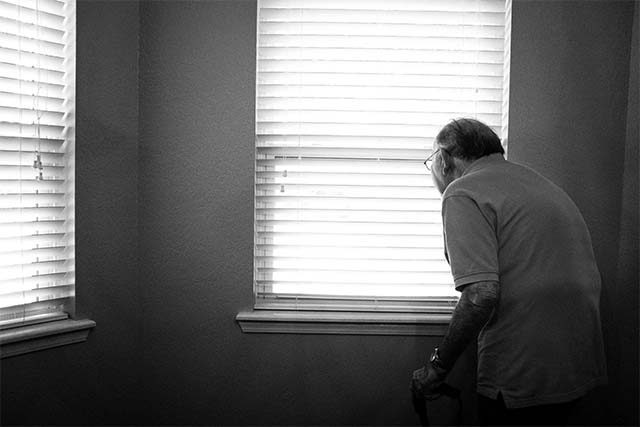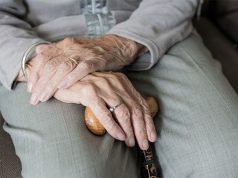Paula* had not been living in her retirement apartment for very long when I arrived for our interview. She welcomed me into a modern, comfortable home. We sat in the living room, taking in the impressive view from her balcony and our conversation unfolded.
Paula, 72, told me how four years ago she’d lost her husband. She had been his carer for over ten years, as he slowly declined from a degenerative condition.
She was his nurse, driver, carer, cook and “bottle-washer”. Paula said she got used to people always asking after her husband and forgetting about her. She told me: “You are almost invisible … you kind of go in the shadows as the carer.”
While she had obviously been finding life challenging, it was also abundantly clear that she loved her husband dearly and had struggled profoundly to cope with his death. I asked Paula how long it took for her to find her bearings, and she replied:
Nearly four years. And I suddenly woke up one day and thought, you idiot, you are letting your life fade away, you have got to do something.
There were photographs of Paula’s late husband on the wall behind her. I noticed a picture of him before his illness took hold. They seemed to be at some sort of party, or wedding, holding glasses of champagne. He had his arm around her. They looked happy. There was a picture of her husband in a wheelchair too. In this picture they both looked older. But still happy.
Losing her husband had left Paula with an irreplaceable void in her life that she was still working out how to fill. In our interview, I glimpsed the extent of the deep, unavoidable sense of loneliness that losing a spouse can create for the bereaved partner – a painful theme our team would revisit many times in our interviews with older people.
The Loneliness Project
The pandemic brought the longstanding issue of loneliness and isolation in the lives of older people back into the public consciousness. When COVID-19 hit, we had only just completed the 80 in-depth interviews which formed the dataset for what we called The Loneliness Project – a large-scale, in-depth exploration of how older people experience loneliness and what it means for them.
I (Sam) am a psychologist with a particular interest in exploring human relationships across the lifespan. Chao, meanwhile, is a research associate based in the Centre for Death and Society at the University of Bath. His research focuses on bereavement experiences and exploring emotional loneliness of people living in retirement communities. For the last two years, we’ve been working on the Loneliness Project with a small research team.
Above all, the project sought to listen to older people’s experiences. We were privileged to hear many people, like Paula, talk to us about their lives, and how growing old and ageing creates unique challenges in relation to loneliness and isolation.
The research – now published in Ageing and Society – generated over 130 hours of conversations and we started to make sense of what our participants told us with an animated film.
We found that ageing brings about a series of inevitable losses that deeply challenge people’s sense of connection to the world around them. Loneliness can often be oversimplified or reduced to how many friends a person has or how often they see their loved ones.
But a particular focus for us was to better understand what underpins feelings of loneliness in older people on a deeper level. Researchers have used the term “existential loneliness” to describe this deeper sense of feeling “separated from the world” – as though there is an insurmountable gap between oneself and the rest of society. Our objective was to listen carefully to how people experienced and responded to this.
The older people in our study helped us to better understand how they felt growing old had affected their sense of connecting to the world – and there were some core themes.
Loss
For many, ageing brought about an inevitable accumulation of losses. Put simply, some of the people we spoke to had lost things that had previously been a major part of feeling connected to something bigger than themselves.
Loss of a spouse or long-term partner (over half of our sample had lost their long-term spouse) was particularly palpable and underlined the deep-rooted sense of loneliness associated with losing someone irreplaceable. Reflecting on the loss of her husband, Paula said:
When he was gone, I didn’t know where I fitted anymore. I didn’t know who I was anymore because I wasn’t [upset] … You just existed. Went shopping, when you needed food. I didn’t want to see people. I didn’t go anywhere.
There was evidence of how painful this irreplaceable void was for people. Douglas, 86, lost his wife five years before speaking to us. He tried his best to articulate the sense of hopelessness, despair – and sheer loss of meaning – it had created for him. He said it hadn’t stopped being difficult, despite the passing of time, adding: “They say it gets better. It never gets better.”
Douglas explained how he never stops thinking about his wife. “It’s hard for people to understand a lot of the time,” he said.
People also talked about how learning to live in the world again felt alien, terrifying and, frequently, impossible. For Amy, 76, relearning how to do the “little things in life” was a lonely and challenging experience.
It took me a long time … just to go down for breakfast on my own … I’d have to bring a paper or a book to sit with. And never ever, I would never, ever go and have a cup of coffee on my own in a coffee shop. So, I literally ‘learnt’ to do that. And that was a biggy, just going to a coffee shop and having a coffee.
Amy said going into busy places on her own was hard because she thought everyone was looking at her. “I would always do it with Tony, my husband, whatever … But to do it on your own, a biggy. It’s stupid, I know, but anyway, hey ho.”
For Peter, 83, the loss of his wife had created a painful void around feelings of touch and physical intimacy that had always made him feel less alone.
I suppose all my life sex has been lovemaking. I mean, we are really getting personal now, but when my wife died, I missed that so, so much. It’s much more enjoyable in old age, you know, because, I mean, if I said it to you you’d think oh good grief, that horrible old body and all the spots and bumps and cuts and wounds and … takes off a wooden leg and … takes out the eye. Sorry [laughs] … But it’s not anything like that because you know you are in the same boat … you get round it, some peculiar way, you accept it all.
Another man, Philip, 73, also described the pain in this loss of intimacy. He said:
At my wife’s funeral, I said the one thing I will miss most is a kiss goodnight. And blow me, afterwards, one of our friends came round, and she said, ‘well, we can send each other kisses if you like but by text every night’, and would you believe, we still are, we still do.
With the very old people we talked with, there was a sense that loss of close and meaningful connections was cumulative. Alice, 93, had lost her first husband, her subsequent partner, her siblings, her friends and, most recently, her only son. With a sense of sadness and weariness, she explained:
You know, underneath it all I wouldn’t mind leaving this world. Everyone has died and I think I’m lonely.
Researchers at Malmö University, Sweden, have described an acute sense of existential loneliness in very old age, that is partly a reflection of an accumulated loss of close connections.
The study found that the result can be understood as if the older person “is in a process of letting go of life. This process involves the body, in that the older person is increasingly limited in his or her physical abilities. The older person’s long term relationships are gradually lost and finally the process results in the older person increasingly withdrawing into him or herself and turning off the outside world”.
‘A stiff upper lip’
Studies of loneliness have highlighted how an inability to communicate can bring about a feeling that “the soul is incarcerated in an insufferable prison”.
This was reflected in our study too. Many of our participants said they had trouble communicating because they simply didn’t have the tools required to convey such complicated emotions and deeper feelings. This led us to contemplate why some older people might not have developed such essential emotional tools.
Research has suggested that older people born in the first half of the 20th century were unwittingly indoctrinated into the concept of the “stiff upper lip”. Through most of their lives – including wartime, peacetime employment, conscription to military service, and family life – there was a requirement to maintain high levels of cognitive control and low levels of emotional expression.
Some of our participants seemed to be implicitly aware of this phenomenon and how it had shaped their generation. Polly, 73, explained it succinctly for us:
If you don’t think about it, if you don’t give it words, then you don’t have to feel the pain … How long is it since men cried in public? Never cry. Big boys don’t cry. That is certainly what was said when I was growing up. Different generation.
People said that wartime childhoods had “hardened them”, led to them suppressing deeper feelings and feeling the need to maintain a sense of composure and control.
For example, Margaret, 86, was a “latchkey child” during the war. Her parents went out at 7am and she had to get up and make her own breakfast at the age of nine. She then had to catch a tram and a bus to get to school and when she got back at night her parents would still be out, working late.
So I used to light the fire, get the dinner ready. But when you are a child, you don’t think about it, you just do it. I mean, no way did I count myself as a neglected child, it was just the way it was in the war, you just had to do it …“
Margaret said it was “just an attitude”. She went to 11 schools, travelled around the country because of the war and had nothing really to do with other people. She added: “I think it makes you a little bit hard … I think sometimes I am a hard person because of it.”
As interviewers who have grown up in a culture that is perhaps more permissive of emotional expression than had been the case for many of the people we interviewed, it was sometimes difficult for us to witness how deep-rooted people’s inability to express their suffering could be.
Douglas was clearly struggling deeply after the death of his wife. But he lacked the tools and relationships to help him work through it. He said he had nobody who was close to him who he could confide in. “People never confided in my family. It was different growing up then,” he added.
Heavy burdens
The burden of loneliness for older people is intimately connected to what they are alone with. As we reach the end of our lives, we frequently carry heavy burdens that have accumulated along the way, such as feelings of regret, betrayal and rejection. And the wounds from past relationships can haunt people all their lives.
Gerontologist professor, Malcolm Johnson, has used the term “biographical pain” to describe psychological and spiritual suffering in the old and frail that involves profoundly painful recollection and reliving of experienced wrongs, self-promises and regretted actions.
He has written that: “Living to be old is still considered to be a great benefit. But dying slowly and painfully, with too much time to reflect and with little or no prospect of redressing harms, deficits, deceits, and emotional pain, has few redeeming features.”
Many of those we spoke to told us how hard it was to be left alone with unresolved pain. For example Georgina, 83, said she learned in early childhood that she was “a bad person … stupid, ugly”. She remembered her brother, as an older man, dying in hospital, “connected to all these machines”. However, she could neither forgive nor forget the abuse he had inflicted upon her during childhood. “My faith told me to forgive him but, ultimately, he scratched me in my soul as a kid,” she added.
People carried memories and wounds from the past that they wanted to talk about, to make sense of and to share. Susan, 83, and Bob, 76, talked about painful and difficult memories from their early family lives.
Susan spoke about how she had a nervous breakdown when her family “disowned” her after she fell pregnant at the age of 17. She said:
I come from this secret family. We all had to present as expected. If you didn’t, you were out, and that was the bottom line. I look back on my life and I wonder that I survived.
While Bob remembered a life of violence at the hands of his father. “I copped so many hidings from him. Then one night … my old man had a bad habit. He would get up and walk past you and smack you in the ribs. I sensed it coming, I was out of my chair in a flash, I caught him, crossed his hands over his wrists, and jammed my knuckle into his Adam’s Apple. That was family life,” he said.
Janet, 75, explained to us that she felt what was lacking from her life was a space where she could talk about, make sense of, and reflect on the biographical pain she had accumulated.
This is what I miss a lot, a private space to talk … All my life I’ve suffered … and some things I do find very hard … With everything that’s gone wrong, I would like to talk to somebody, no advice, I want to let off steam, make sense of it all, I suppose. But it doesn’t happen.
Your life mattered
Thinking about how older people can be supported must involve a fuller understanding of what loneliness really means for them. Some of our own efforts have focused on ways of helping older people retain a sense that they are valued in the world and that they matter.
For example, the Extraordinary Lives Project sought to listen to older people’s recollections, wisdom and reflections. Sharing these recollections with others, including younger generations, has been mutually beneficial and helped older people to feel that the lives they have lived counted for something.
There is also a need to consider how to support older people in relation to coping with some of the inevitable losses ageing creates that threaten their sense of connection to the world. Organiations seeking to connect people going through these struggles can play a role in developing a sense of “coping together”.
Such organizations already exist in relation to support for widows, provision of spaces like death cafes to talk about death and dying and improving access to and awareness of psychological and emotional therapies for older people.
So support is out there but it is often fragmented and difficult to find. A core challenge for the future is to create living environments in which these mechanisms of support are embedded and integrated into older people’s communities.
Listening to all these experiences helped us to appreciate that loneliness in later life runs deep – much deeper than we might think. We learned that growing old and approaching the end of life create unique sets of circumstances such as loss, physical deterioration and biographical pain and regret that can give rise to a unique sense of disconnection from the world.
Yet people can and did find their way through the significant challenges and disruptions that ageing had posed them. Before I (Sam) left her apartment, Paula made me a cup of tea and a ham sandwich and told me:
It’s funny, you know, I had a building which I had inherited, and I had some money in the bank but who was I, what was I anymore? That was my main challenge. But now, four years later, I’ve moved to a retirement village and I’m noticing there’s just a little thrill associated with being able to do exactly as I please – and if people say, ‘Oh but you should do this,’ I go, ‘No, I shouldn’t!’
*All names in this article have been changed to protect the anonymity of those involved.![]()
Sam Carr, Senior Lecturer in Education with Psychology, University of Bath and Chao Fang, Research Associate, University of Bath. This article is republished from The Conversation under a Creative Commons license. Read the original article.









